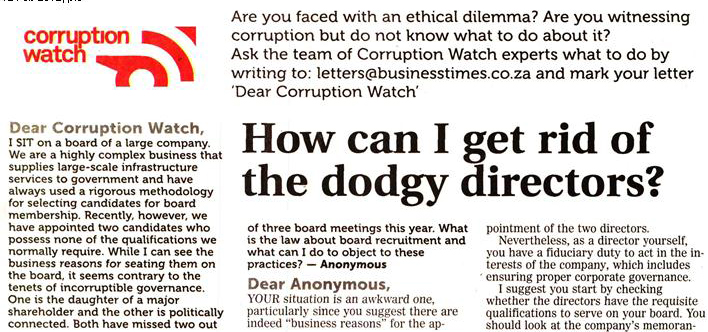|
Getting your Trinity Audio player ready...
|

Are you witnessing corruption but don’t know what to do about it? Ask the team of Corruption Watch experts what to do by writing to: letters@businesstimes.co.za and mark your letter ‘Dear Corruption Watch’.
Dear Corruption Watch
I sit on a board of a large company. We are a highly complex business that supplies large-scale infrastructure services to government and have always used a rigorous methodology for selecting candidates for board membership.
Recently, however, we have appointed two candidates who possess none of the qualifications we normally require. While I can see the business reasons for seating them on the board, it seems contrary to the tenets of incorruptible governance. One is the daughter of a major shareholder and the other is politically connected. Both have missed two out of three board meetings this year. What is the law about board recruitment and what can I do to object to these practices? – Anonymous
Dear Anonymous,
Your situation is an awkward one, particularly since you suggest there are indeed “business reasons” for the appointment of the two directors.
Nevertheless, as a director yourself, you have a fiduciary duty to act in the interests of the company, which includes ensuring proper corporate governance.
I suggest you start by checking whether the directors have the requisite qualifications to serve on your board. You should look at the company’s memorandum of incorporation (MOI), which may stipulate those qualifications.
If the board fails to remove the directors under these circumstances, you could rely on a new remedy under the Companies Act of 2008, which empowers a court to prohibit anyone from serving as a director if they are ineligible.
Before taking the litigious route, however, you should advise your colleagues on the board that by knowingly permitting ineligible people to act as directors they are liable for breach of their fiduciary duties. They are thus placing their own positions on the board in jeopardy.
If the two directors do have the requisite qualifications, or if the company’s MOI is silent on this score, there may be grounds to remove the directors on the basis of negligence.
Given the complexities of your company’s business and the high stakes involved, the directors may reasonably be expected to exercise an appreciable degree of diligence, which includes attending meetings.
Since it is still early days in their tenure, it may suffice simply to caution the errant directors and advise them of their responsibilities. If this fails, the board may (by a simple majority vote) remove directors who have “neglected or been derelict in the performance of the functions of a director”.
The board must follow certain procedures under the Companies Act though – including providing the directors concerned with notice of the proposed resolution and reasons, as well as an opportunity to present a response before the board votes.
Alternatively, a court can place directors under probation and supervision if they have acted in a manner “materially inconsistent with the duties of a director”. And do not forget the shareholders: if they elected the directors, shareholders may resolve to remove them by ordinary resolution at a shareholders’ meeting – at any time and for any reason they deem fit.
Take a stand and report an incident of corruption. This article originally appeared in the Sunday Times Business Times on 12 February 2012.


